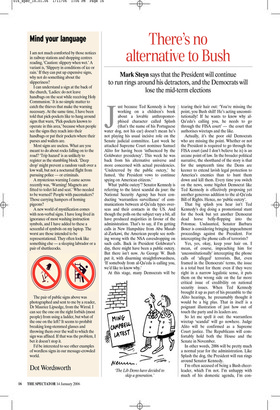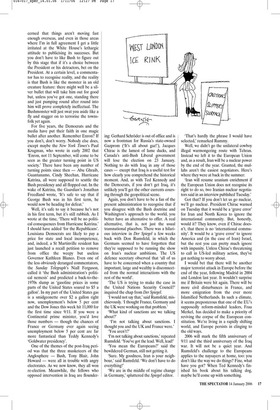There’s no alternative to Bush
Mark Steyn says that the President will continue to run rings around his detractors, and the Democrats will lose the mid-term elections Just because Ted Kennedy is busy working on a children’s book about a lovable anthropomorphised character called Splash (that’s the name of his Portuguese water dog, not his car) doesn’t mean he’s not playing his usual incisive role on the Senate judicial committee. Last week he attacked Supreme Court nominee Samuel Alito for having been ‘influenced by the Goldwater presidency’. This week he was back from his alternative universe and more concerned with actual presidencies. ‘Undeterred by the public outcry,’ he fumed, ‘the President vows to continue spying on American citizens.’ What ‘public outcry’? Senator Kennedy is referring to the latest scandal du jour: the National Security Agency has been conducting ‘warrantless surveillance’ of communications between al-Qa’eda types overseas and their contacts in the US. And though the polls on the subject vary a bit, all have produced majorities in favour of the administration. That’s to say, if I’m getting calls in New Hampshire from Abu Musab al-Zarkawi, the American people see nothing wrong with the NSA eavesdropping on such calls. Back in President Goldwater’s day, there might have been a public outcry. But there isn’t now. As George W. Bush put it, with disarming straightforwardness, ‘If somebody from al-Qa’eda is calling you, we’d like to know why.’ At this stage, many Democrats will be tearing their hair out: ‘You’re missing the point, you Bush shill! He’s acting unconstitutionally! If he wants to know why alQa’eda’s calling you, he needs to go through the FISA court’ — the court that authorises wiretaps and the like.
Actually, it’s the poor old Democrats who are missing the point. Whether or not the President is required to go through the FISA court (and I don’t believe he is) is an arcane point of law. In the broader political narrative, the shorthand of the story is that for the umpteenth time the Dems are keener to extend lavish legal protection to America’s enemies than to hunt them down and kill them. Every time you switch on the news, some bigshot Democrat like Ted Kennedy is effectively proposing yet another generous addition to the al-Qa’eda Bill of Rights. Hence, no ‘public outcry’.
That big splash you hear isn’t Ted Kennedy’s dog doing a promotional stunt for the book but yet another Democrat dead horse belly-flopping into the Potomac. Undaunted, Senator Barbara Boxer is considering bringing impeachment proceedings against the President. For intercepting the phone calls of terrorists?
Yes, yes, okay, keep your hair on. I mean, of course, impeaching him for ‘unconstitutionally’ intercepting the phone calls of ‘alleged’ terrorists. But, even framed in the Democrats’ terms, the issue is a total bust for them: even if they were right in a narrow legalistic sense, it puts them on the wrong side on the far more critical issue of credibility on national security issues. When Ted Kennedy brought it up as part of his preamble to the Alito hearings, he presumably thought it would be a big plus. That in itself is a poignant illustration of just how out of touch the party and its leaders are.
So let me spell it out: the warrantless wiretap ‘scandal’ will go nowhere. Judge Alito will be confirmed as a Supreme Court justice. The Republicans will comfortably hold both the House and the Senate in November.
In other words, 2006 will be pretty much a normal year for the administration. Like Splash the dog, the President will run rings around Senator Kennedy.
I’m often accused of being a Bush cheerleader, which I’m not. I’m unhappy with much of his domestic agenda, I’m con cerned that things aren’t moving fast enough overseas, and even in those areas where I’m in full agreement I get a little irritated at the White House’s lethargic attitude to publicising its successes. But you don’t have to like Bush to figure out by this stage that if it’s a choice between the President or his detractors, bet on the President. At a certain level, a commentator has to recognise reality, and the reality is that Bush is like the monster in an old creature feature: there might well be a silver bullet that will take him out for good but, unless you’ve got one, standing there and just pumping round after round into him will prove completely ineffectual. The Bushmonster will just swat you aside like a fly and stagger on to terrorise the townsfolk yet again.
For five years, the Democrats and the media have put their faith in one magic bullet after another. Remember Enron? If you don’t, don’t worry. Nobody else does, except maybe the New York Times’s Paul Krugman, who wrote in early 2002 that ‘Enron, not 11 September, will come to be seen as the greater turning point in US society.’ There have been any number of turning points since then — Abu Ghraib, Guantanamo, Cindy Sheehan, Hurricane Katrina, all were supposed to scuttle the Bush presidency and all flopped out. In the wake of Katrina, the Guardian’s Jonathan Freedland wrote, ‘It’s safe to say that if George Bush was in his first term, he would now be heading for defeat.’ Well, it’s safe to say it because he’s not in his first term, but it’s still rubbish. As I wrote at the time, ‘There will be no political consequences from Hurricane Katrina.’ I should have added ‘for the Republicans’. Louisiana Democrats are likely to pay a price for state and local incompetence, and, indeed, a St Martinville resident has just launched a recall petition to remove from office the weepy but useless Governor Kathleen Blanco. Even one of the less obviously deranged commentators, the Sunday Telegraph’s Niall Ferguson, called it ‘the Bush administration’s political nemesis’ and predicted a back-to-the1970s slump as ‘gasoline prices in some parts of the United States soared to $5 a gallon’. In my part of the United States gas is a smidgeonette over $2 a gallon right now, unemployment’s below 5 per cent and the Dow Jones this week hit 11,000 for the first time since 9/11. If you were a Continental prime minister, you’d love those numbers — though the chances of France or Germany ever again seeing unemployment below 5 per cent are far more fantastical than Teddy Kennedy’s ‘Goldwater presidency’.
One of the themes of the post-Iraq period was that the three musketeers of the Anglosphere — Bush, Tony Blair, John Howard — were all in trouble with angry electorates. As we now know, they all won re-election. Meanwhile, the fellows who opposed intervention in Iraq are flounder ing: Gerhard Schröder is out of office and is now a frontman for Russia’s state-owned Gazprom (‘It’s all about gaz!’), Jacques Chirac is the lamest of lame ducks, and Canada’s anti-Bush Liberal government will lose the election on 23 January. Nothing to do with Iraq in any of those cases — except that Iraq is a useful test for how clearly you comprehend the historical moment. And, as with Ted Kennedy and the Democrats, if you don’t get Iraq, it’s unlikely you’ll get the other currents coursing through the geopolitical scene.
Again, you don’t have to be a fan of the present administration to recognise that if you disagree with the Bush doctrine and Washington’s approach to the world, you better have an alternative to offer. A real alternative, that is, not just the usual transnational placebos. There was a hilarious interview in Der Spiegel a few weeks back with Don Rumsfeld, in which the Germans seemed to have forgotten that they’re supposed to be running the show on Iran’s nuclear ambitions. The US defence secretary observed that ‘all of us have to be concerned when a country that important, large and wealthy is disconnected from the normal interactions with the rest of the world’.
‘The US is trying to make the case in the United Nations Security Council?’ inquired the chap from Der Spiegel.
‘I would not say that,’ said Rumsfeld, mischievously. ‘I thought France, Germany and the UK were working on that problem.’ ‘What kind of sanctions are we talking about?’ ‘I’m not talking about sanctions. I thought you and the UK and France were.’ ‘You aren’t?’ ‘I’m not talking about sanctions,’ repeated Rumsfeld. ‘You’ve got the lead. Well, lead!’ ‘You mean the Europeans?’ said the bewildered German, still not getting it.
‘Sure. My goodness, Iran is your neighbour,’ said Rumsfeld. ‘We don’t have to do everything!’ ‘We are in the middle of regime change in Germany,’ spluttered the Spiegel editor. ‘That’s hardly the phrase I would have selected,’ remarked Rummy.
Well, we didn’t go the unilateral cowboy illegal warmongering route with Tehran. Instead we left it to the European Union and, as a result, Iran will be a nuclear power by the end of the year. Granted, the mullahs aren’t the easiest negotiators. Here’s where they were at back in the summer: ‘Iran will resume uranium enrichment if the European Union does not recognise its right to do so, two Iranian nuclear negotiators said in an interview published Tuesday.’ Got that? If you don’t let us go nuclear, we’ll go nuclear. President Chirac warned on Tuesday that it would be a ‘grave error’ for Iran and North Korea to ignore the international community. But, honestly, would it? They know, even if Chirac doesn’t, that there is no ‘international community’. It would be a ‘grave error’ to ignore America and (in the case of Iran) Israel, but the rest you can pretty much ignore with impunity. Unless Chirac’s threatening to call in US-led military action, they’ve got nothing to worry about.
I would bet that there will be another major terrorist attack in Europe before the end of the year, following Madrid in 2004 and London last year. It wouldn’t surprise me if Britain were hit again. There will be more civil disturbances in France, and more emigration from the ever more Islamified Netherlands. In such a climate, it seems preposterous that one of the EU’s supposedly reform-minded leaders, Frau Merkel, has decided to make a priority of reviving the corpse of the European constitution. We’re living in a rapidly shifting world, and Europe persists in clinging to the old ways.
2006 will mark the fifth anniversary of 9/11 and the third anniversary of the Iraq war. It will not be a quiet year. And Rumsfeld’s challenge to the Europeans applies to the naysayers at home, too: you don’t like the way we do things? Fine, what have you got? When Ted Kennedy’s finished his book about his talking dog, maybe he’ll come up with something.















































 Previous page
Previous page